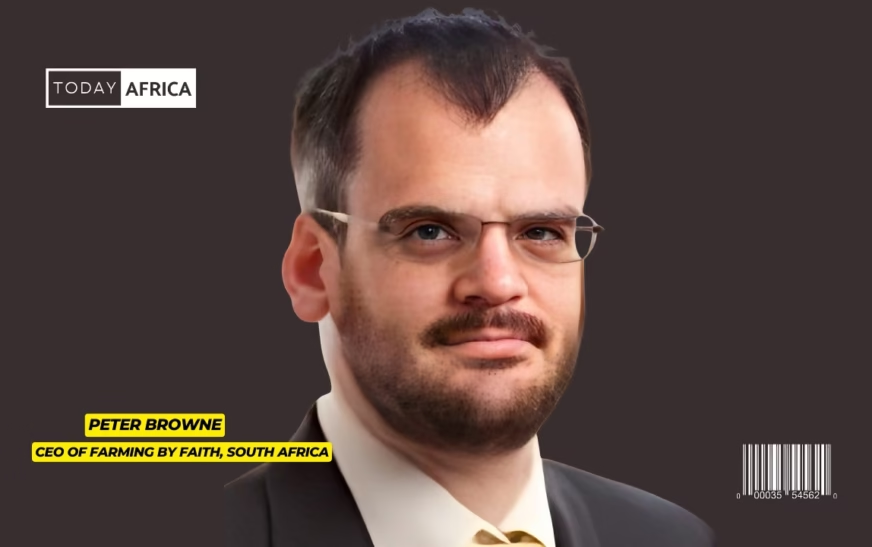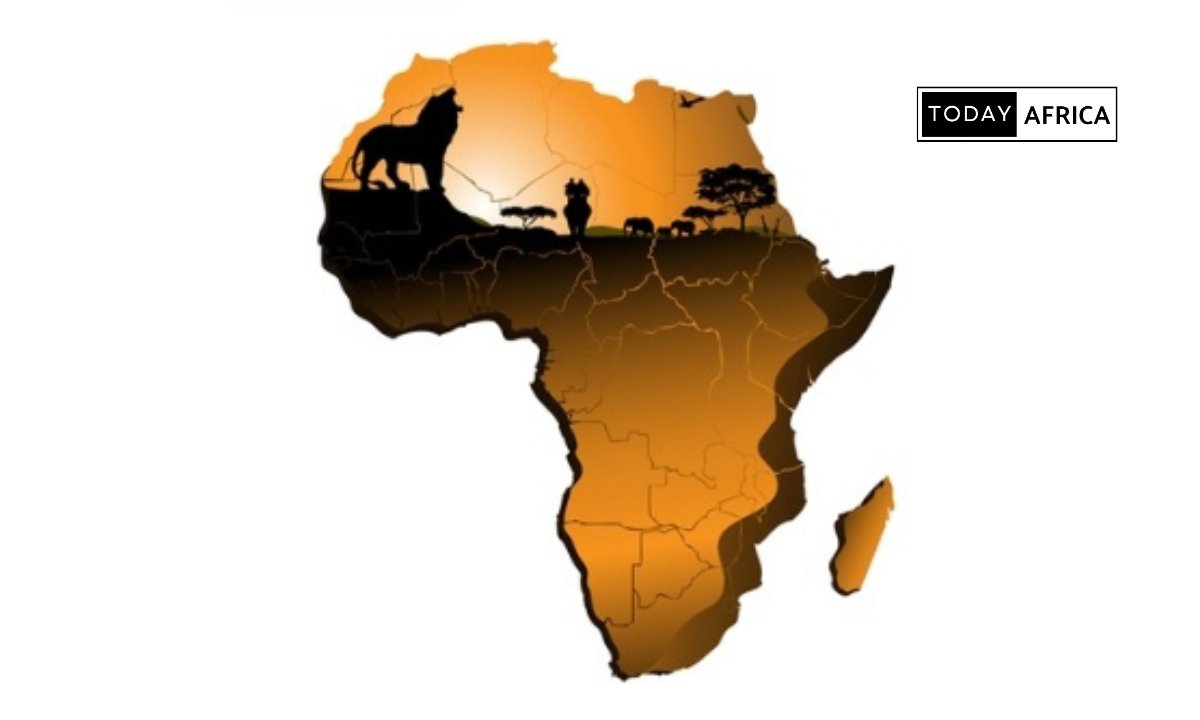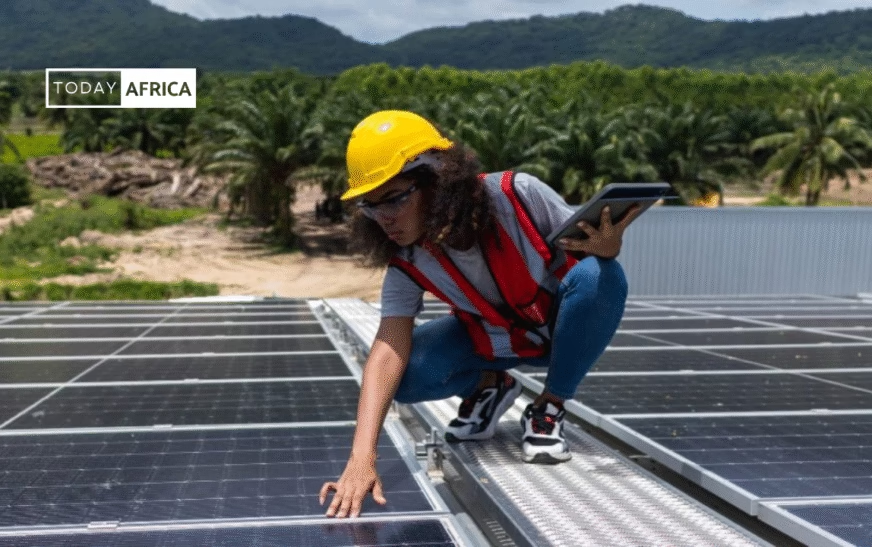In a world where poverty, food insecurity, and inequality continue to shape the lives of millions, Peter Browne is using faith and tech to empower emerging agripreneurs in South Africa.
A South African mathematician-turned-entrepreneur, Peter walked away from successful businesses to pursue a bold vision: using digital innovation to uplift emerging farmers and combat poverty at scale.
As the Founder and CEO of Farming By Faith, a digital platform that equips African farmers with tools to improve productivity, access markets, and become profitable, Peter is rewriting the script for agriculture on the continent.
His journey – from running a fish farm that empowered recovering drug addicts to exploring blockchain-powered currencies for farmers – is a testimony to purpose-driven innovation.
In this powerful and deeply insightful interview with Today Africa, Peter shares the hard-earned lessons from his failures, how biblical principles guide his leadership, and why he believes Africa’s agricultural future must be digital, inclusive, and built on faith.
Who is Peter Browne, really?
He begins, almost bashfully, “I’m a researcher. I read a lot. I love to watch videos and see the world around me.”
But the soft-spoken manner masks a restless mind. Browne’s fascination with the internet is palpable. “It’s a fantastic technology,” he says, “because it has enabled us to come up with new ways of inventing new ways.”
That recursive turn of phrase – “inventing new ways of inventing” – is Browne to the core. He’s always one step ahead, interrogating the patterns of progress and imagining alternatives.
This curiosity led him to Bridges for Enterprise, a global accelerator that supports social impact ventures in emerging markets. It also seeded his deep interest in African agriculture.
For the past eight years, Browne has been trying to solve one of the continent’s most pressing problems: how do you make farming a vehicle for prosperity instead of poverty?
Why farming? Were you born into a farming family?
“No,” he says, without hesitation. “I studied to be a mathematician.”
This is not the story of a generational farmer. It’s the story of someone who wandered into the agricultural world from the outside, and saw its failings with brutal clarity.
Having sold his businesses and achieved a level of financial independence, Browne found himself grappling with a truth that money couldn’t fix.
“The price of things keeps going up. Tax keeps going up. I thought, there has to be a different way,” he explains.
I actually had a fish farm and it had some fiberglass manufacturing on it.
That led him to buy the farm, where he had some fiberglass manufacturing on it and even tried employing recovering drug addicts to rehabilitate their lives through work.
But scaling up was a slow and expensive grind. “I realized I needed to shift my focus to building a digital platform,” he says. “That’s how I could really help.”
Read Also: Ayoola Ogunyomi on Bridging the Investment-Exit Gap in Africa’s Startup Ecosystem
What lesson did you learn, and how are you applying it to your present venture?
The most powerful lesson wasn’t agricultural. It was strategic.
“I put a lot of money into fixed assets – vehicles, infrastructure,” he says. “But if you’re going to take on something like poverty, you have to think about how many people you need to help, not just your one project.”
Instead of trying to be a savior with a spade, Browne turned to code.
Today, the newest version of Farming By Faith uses artificial intelligence to create educational content for emerging farmers, bite-sized, engaging, and accessible. The next stage? A national farming competition, done in partnership with an agri-tech initiative.
“It’s about creating digital leads for farmers, then connecting them to training and capital,” he explains. “And being lean while doing it.”
What is Farming By Faith?
Farming By Faith is Peter’s digital vision made real. Rather than delivering farming lessons himself, Peter curates partnerships with organizations that provide specialized training.
His role is to generate “digital leads”, connecting eager learners to quality education and resources. “The goal is to build a very solid digital presence that drives projects for others,” he explains.
This lean model reflects lessons learned from past ventures. “If I get caught up spending on expensive assets or staff, I won’t be effective in helping farmers.”
Currently, the team is small: Peter, the concept, and a developer outsourcing platform work. It’s a strategy grounded in efficiency and impact.
So, why the name “Farming By Faith”?
The answer is not metaphorical.
Browne speaks openly about the project’s Christian roots. “We were helping recovering drug addicts. There was a very strong religious aspect,” he says.
But it goes deeper than moral mission. Browne draws strategy from scripture. His inspiration is Joseph—the biblical figure who rose from prison to become the de facto prime minister of Egypt, managing resources during a famine.
“Joseph controlled Egypt because he controlled the food,” Browne says. “If I can solve man’s issues around food, even presidents would take notice.”
His favorite biblical lessons are economic in nature. He cites debt forgiveness, land redistribution, and the concept of jubilee. “In man’s system, there’s no way back,” he says. “But in the Bible’s system, you can go from prisoner to second in command.”
When he lost one of his farms to the bank, this theology wasn’t just comforting, it became strategy.
Read Also: Why Fana Haregot is Building More Than a Business, She’s Building Hope
What lessons from the Bible are you applying to Farming By Faith?
Peter finds a personal connection with Joseph’s story — a man imprisoned yet lifted to power by his ability to solve society’s food crisis.
“If I can solve issues around food, then whoever is president or pharaoh in a country would be interested in that,” he says thoughtfully.

He reflects on the contrast between modern financial systems and biblical economic principles.
“The Bible talks about land being returned after a reset, a way out of poverty if people lose assets,” Peter says. Having lost farms to banks himself, he understands this tension intimately.
“In the worldly system, there is no way back. But in the biblical system, even prisoners can rise to power.”
How can you bridge the gap between rich and poor farmers?
Peter’s approach is multi-faceted and experimental. One innovation is a community currency, a microcredit system for farmers that operates without disrupting national economies.
“I have a partner in England working on blockchain for social impact,” he explains. Their project in Kenya runs a community-based currency enabling farmers to access credit and build economic stability.
Another avenue Peter explores is generating capital through financial market speculation, funneling profits back into farming projects.
“I love innovating and finding new ways to deal with money differently,” he says with enthusiasm. These strategies underline his willingness to rethink traditional models to empower emerging farmers.
What challenges have you faced?
Starting Farming By Faith wasn’t without hurdles. Peter acknowledges the uncertainty of launching a project of this scale.
“After two years with the farming project for recovering addicts, I got help from Bridges for Enterprise, a global accelerator,” he recounts.
They provided pro bono consulting on business plans, financial models, and tech development — a lifeline for Peter’s evolving vision.
“This kind of support has been crucial,” he admits.
“Others may struggle more if they focus only on money without access to these networks.” His story is a testament to the power of collaboration and global social entrepreneurship.
Read Also: How Christopher O. Fallah Empowers Liberia’s Unbanked & Offline Citizens
What’s the business model behind Farming By Faith?
Right now, Browne admits, the venture is still pre-revenue.
But he’s building.
He hopes to tap into the growing “education pie” by partnering with training providers. “They already charge farmers for services,” he says. “If I can bring them leads, I can earn a percentage.”
Other revenue strategies include consulting, facilitating high-ticket purchases like container farms, and earning a share of the blockchain currency once launched.
“I’ve built the branding,” he says. “Now it’s about monetizing it.”
Who can join? What kind of farmers are your targets?
Browne wants Farming By Faith to be a digital harbor for all kinds of growers—from first-timers with ambition to experienced agriculturalists seeking strategic support.
“Maybe they already have funds or access to land,” he says. “Maybe they just need guidance.”
He’s especially passionate about bridging South Africa’s historic agricultural divide. “We have a well-established industry, but it’s controlled by a small percentage—mainly Afrikaans farmers.”
His vision? A digital platform that connects experienced farmers with emerging ones, redistributing not just land, but knowledge and opportunity.
“In South Africa, if you can offer a stable job, you’ll get many applicants,” he says. “We have no shortage of people who want to farm. What we lack are systems that support them.”
Don’t you think that the well-established farmers would be upset?
He doesn’t flinch at the idea of resistance. “We operate under a free market in South Africa,” he says, “where if you come in with a better solution to solve a problem, the market dictates whether you succeed.”
And his solution is as radical as it is simple: a digital platform that connects landowners with emerging farmers.
But unlike existing listings websites that leave the buyer and seller to their own devices, Farming By Faith wants to stay in the soil with you, offering support, partnerships, and access to retail networks.
“It’s not just about transaction,” he explains. “It’s about transformation.”
In his eyes, this isn’t about stepping on toes, it’s about opening doors.
Read Also: How Buyiswa Twala is Reviving Dead Soil and Fighting Hunger in South Africa
Don’t you think that there are people who control every free and open market?
A slow, deliberate nod. “That’s what I’m trying to pioneer,” he says. “An entrepreneur who didn’t come from a farming background but still wants to help solve this problem.”
He draws an uncomfortable parallel to Zimbabwe, where land redistribution policies, meant to address inequality, spiraled into economic collapse. “It created a very elite, wealthy upper class,” he explains, “and the majority were left behind.”
The cautionary tale sits like a warning on his shoulders. But so does the urgency: idle hands, joblessness, and a hunger, both literal and figurative, that’s devouring rural South Africa.
“You don’t have to go very far to see people just standing around with nothing to do,” he says. “So the demand is there. It’s screaming at us.”
For him, control is not about dominance, it’s about direction. A digital bridge, rather than a political hammer.

How do you attract and retain these farmers on your platform?
The answer is both strategic and spirited: community.
“I’m in talks with another agri-tech founder,” he shares. “He’s got a model that builds community platforms for a small fee, and we can access his farmer network.”
The plan? To launch a competition, though the final format is still in the works, that brings emerging farmers onto the platform and gives them a reason to stay.
But more than gimmicks, what he offers is continuity. He’s building pipelines that don’t just link farmers to land, but to retail partnerships and supply chains.
“Once they’re spending money, once they’ve got a project going,” he says, “you’ve got something to build on.”
This isn’t an app. It’s an ecosystem.
What key lessons have you learned as an entrepreneur?
He laughs, the sound brief and unpolished. “Don’t lose money,” he says. “It’s quite a serious one.”
For someone who once went bankrupt, it’s less advice and more scar tissue. “Even though I hit financially hard times, I’m still going,” he adds. “Because the idea is still there.”
He talks of capital as sacred, of strategy as survival. But even more powerful than his financial prudence is his resilience.
“The key lesson is don’t give up,” he says. “That’s just how business is. Sometimes you make money. Sometimes you lose money.”
What sets him apart is not just his refusal to stay down—but his belief that the climb back up can be guided by faith and data in equal measure.
Read Also: African Startup Stories of 16 Entrepreneurs We Interviewed
Your advice to people who want to venture into the agricultural business?
His answer is grounded—literally. “Start with an apprenticeship,” he says. “Get involved in projects. Show your worth. Learn the processes.”
He believes in sweat equity. Not just being “the employee who’s there for the paycheck,” but becoming the one who asks questions, moves between departments, understands how a crop is grown, how it’s priced, and how it’s sold.
“Ask questions,” he insists. “It gets you free advice.” That hunger to learn, to pull wisdom from every corner of the farm, is what separates a participant from a pioneer.
His own education started not in a classroom but on the internet. “What inspired me was seeing how many farming videos there were on YouTube,” he says.
That revelation led him to develop an AI system that crawls the web, harvesting content for farmers the way others harvest maize.
For him, knowledge is the new fertilizer. And YouTube is where to start.
Contact or follow Peter Browne:
Leave a comment and follow us on social media for more tips:
- Facebook: Today Africa
- Instagram: Today Africa
- Twitter: Today Africa
- LinkedIn: Today Africa
- YouTube: Today Africa Studio
















